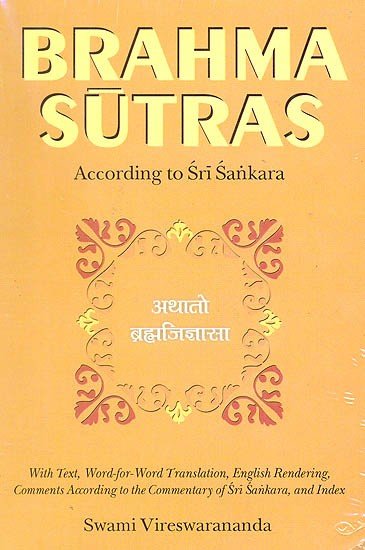Brahma Sutras (Shankara Bhashya)
by Swami Vireshwarananda | 1936 | 124,571 words | ISBN-10: 8175050063
This is the English translation of the Brahma-sutras including the commentary (Bhashya) of Shankara. The Brahma-sutra (or, Vedanta-sutra) is one of the three canonical texts of the Vedanta school of Hindu philosophy and represents an early exposition the Vedantic interpretation of the Upanishads. This edition has the original Sanskrit text, the r...
Chapter I, Section II, Adhikarana II
Adhikarana summary: The eater is Brahman
Brahma-Sutra 1.2.9: Sanskrit text and English translation.
अत्ता चराचरग्रहणात् ॥ ९ ॥
attā carācaragrahaṇāt || 9 ||
attā—The eater; carācaragrahaṇāt—because the movable and immovable (i.e. the whole universe) is taken (as his food).
9. The eater (is Brahman), because both the movable and immovable (i.e. the entire universe) is taken (as his food).
“Who thus knows where He is, to whom the Brahmanas and Kshatriyas are (as it were) but food and death itself a condiment” (Kath. 1. 2. 25)?
This passage says that there is some eater. Who is this eater referred to by ‘He’? Is it the fire referred to in another text as eater : “Soma indeed is food, and fire the eater” (Brih. 1. 4. 6); or is it the individual soul referred to as eater in, “One of them eats the sweet fruit” (Mu. 3. 1. 1). This Sutra says it is neither, but the Supreme Lord, for the text says that in Him the whole of creation, movable and immovable, is reabsorbed. The fact that death, which destroys everything else, is swallowed up as a condiment, shows that the entire creation is referred to as His food. The Brahmanas and Kshatriyas are mentioned as mere examples, since thty are the foremost of created beings. The eater of such a stupendous thing can be Brahman alone and none else.
Brahma-Sutra 1.2.10: Sanskrit text and English translation.
प्रकरणाच्च ॥ १० ॥
prakaraṇācca || 10 ||
prakaraṇāt—From the context; ca—and.
10. And because (Brahman) is the subject of the discussion.
In an earlier text Nachiketas asks Yama:
“Tell me of that which you see as neither good nor bad action, as neither effect nor cause, as neither past nor future” (Kath. 1. 2. 14).
In this text Brahman is inquired into and Yama answers : “I will tell you in brief—it is Aum” (Kath. 1. 2. 15). Further on he says, “The Self is neither born nor does it die” (Ibid. 1. 2. 18), and finally concludes with the passage in which the eater is mentioned. All this clearly shows that Brahman is the topic, and therefore the ‘eater’ is Brahman. It also follows from the peculiar characteristic, viz. the difficulty to cognize It, which is referred to in the text under discussion.
An objection may be raised on the ground that the scripture itself in another place denies that Brahman is the ‘eater’: “The other (Brahman) looks on without eating” (Mu. 8. 1. I). But ‘eating’ in this text refers to the experience of pleasure and pain, while in the text under discussion it means the feabsorption of the universe at the time of dissolution, which the scriptures attribute to Brahman alone.
